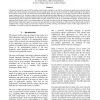Free Online Productivity Tools
i2Speak
i2Symbol
i2OCR
iTex2Img
iWeb2Print
iWeb2Shot
i2Type
iPdf2Split
iPdf2Merge
i2Bopomofo
i2Arabic
i2Style
i2Image
i2PDF
iLatex2Rtf
Sci2ools
97
Voted
LREC
2010
2010
Extracting Surface Realisation Templates from Corpora
In Natural Language Generation (NLG), template-based surface realisation is an effective solution to the problem of producing surface strings from a given semantic representation, but many applications may not be able to provide the input knowledge in the required level of detail, which in turn may limit the use of the available NLG resources. However, if we know in advance what the most likely output sentences are (e.g., because a corpus on the relevant application domain happens to be available), then corpus knowledge may be used to quickly deploy a surface realisation engine for small-scale applications, for which it may be sufficient to select a sentence (in natural language) that resembles the desired output, and then modify some or all of its constituents accordingly. In other words, the application may simply 'point to' an existing sentence in the corpus and specify only the changes that need to take place to obtain the desired surface string. In this paper we describ...
Related Content
| Added | 29 Oct 2010 |
| Updated | 29 Oct 2010 |
| Type | Conference |
| Year | 2010 |
| Where | LREC |
| Authors | Thiago D. Tadeu, Eder M. de Novais, Ivandré Paraboni |
Comments (0)

